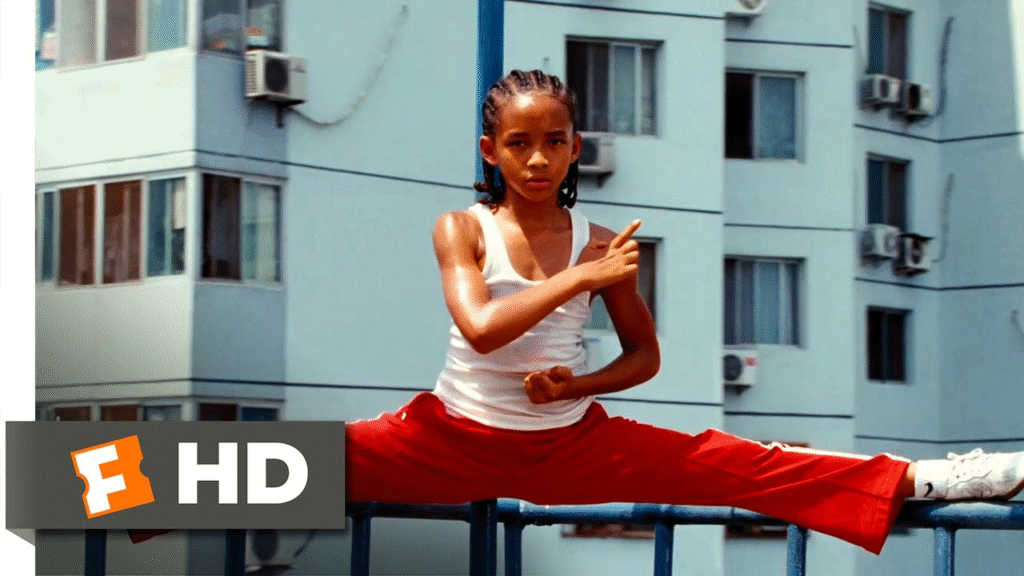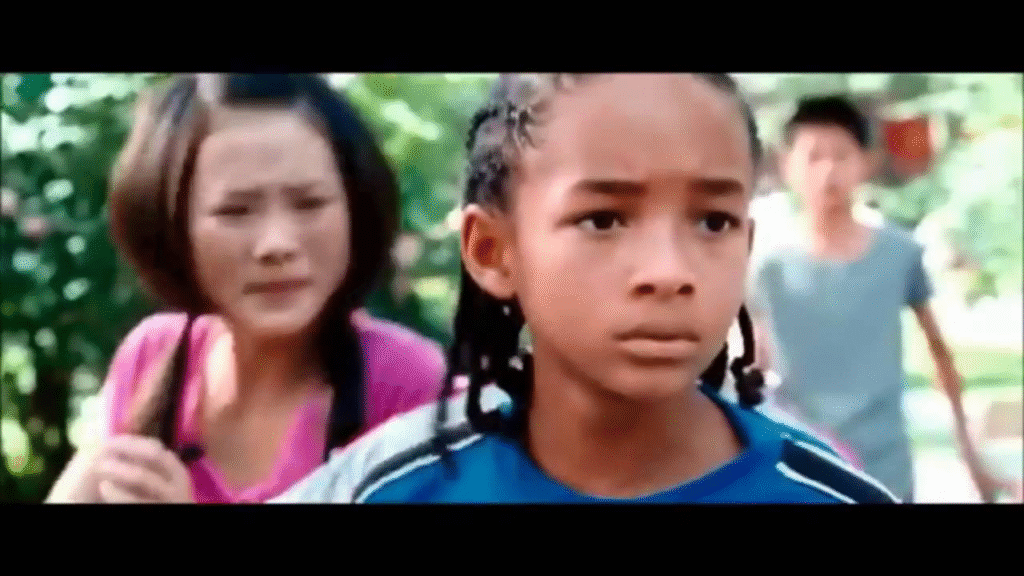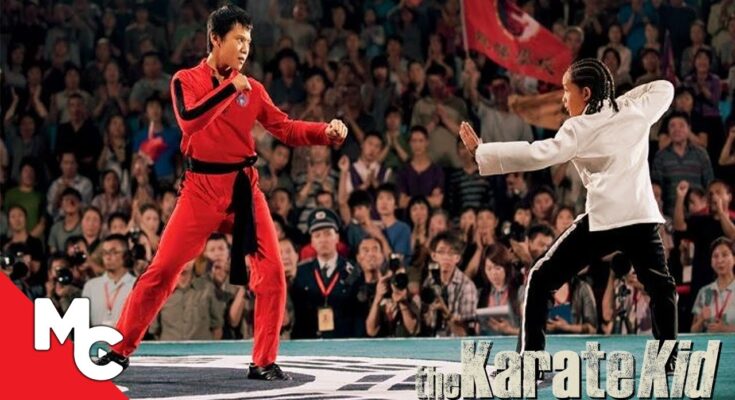🎬 The Karate Kid (2010) 🥋🌟
⭐️⭐️⭐️⭐️ (4/5)
Jaden Smith | Jackie Chan | Taraji P. Henson
The Karate Kid (2010) is a heartfelt reimagining of the beloved 1984 classic, offering a fresh perspective on an enduring story about overcoming adversity. Directed by Harald Zwart, this film brings a new generation of viewers into the world of martial arts, blending action with profound life lessons in a culturally rich setting. While the premise of a young boy learning karate under the mentorship of a wise, older figure remains intact, the film introduces new dynamics, challenges, and environments, breathing new life into the timeless tale.
At the center of the story is Dre Parker (Jaden Smith), a 12-year-old boy who is forced to relocate from Detroit to Beijing with his mother (played by Taraji P. Henson). Their move to China comes with significant challenges: not only does Dre have to contend with the cultural shock and emotional turbulence of living in a foreign country, but he also faces bullying from a group of students at his new school, particularly Cheng (Zhenwei Wang), a skilled kung fu practitioner who makes Dre’s life miserable.

Dre’s internal struggle is the emotional heart of the film. He feels isolated, unable to find his place in this new world, which causes him to retreat inwardly. The bullying he faces from Cheng and his friends forces him to wrestle with feelings of inadequacy, frustration, and helplessness. However, Dre’s journey to self-discovery begins when he meets Mr. Han (Jackie Chan), a kung fu master who works as a maintenance man in Dre’s apartment complex. At first, Mr. Han seems like an unlikely mentor, but he is exactly what Dre needs — not only as a teacher of martial arts but as a guide for life.
Mr. Han, played masterfully by Jackie Chan, is an enigmatic figure whose wisdom and experience go far beyond his skills in kung fu. His training methods are unorthodox, with the famous “wax on, wax off” scene, but it’s clear that his teaching goes deeper than just learning martial arts techniques. He teaches Dre the importance of balance, patience, discipline, and respect — values that transcend the physical aspects of kung fu and apply to life itself. Through this mentorship, Dre learns to transform his fear and insecurity into strength and resilience. This relationship is one of the most compelling aspects of the film, as Mr. Han’s mentorship offers Dre the tools to stand up for himself, confront his fears, and find peace within.

Jaden Smith delivers a nuanced and emotionally resonant performance as Dre, showing significant growth as the film progresses. His character arc is relatable and believable, as we watch Dre go from an unsure, timid boy to someone who finds the courage to take on his fears. The scenes where Dre first begins to understand the principles of kung fu — the meditative calm, the precise movements, and the focus required — are beautifully captured, allowing audiences to experience the physical and emotional challenges he faces.
Jackie Chan’s performance as Mr. Han is a revelation. Known for his action-comedy roles, Chan brings a level of depth and gravitas to the character that is both surprising and moving. Mr. Han’s backstory is unveiled slowly, adding an emotional layer to the film that makes him not just a mentor but a man with his own personal struggles and losses. His wisdom is hard-earned, and his tough exterior hides a compassionate heart. Through Mr. Han’s character, The Karate Kid (2010) explores the idea of healing from past wounds, both physically and emotionally. Chan’s portrayal of this character is one of his best performances to date, proving that his talents go far beyond physical action.
The relationship between Dre and Mr. Han is not just about martial arts — it’s about building trust, learning through hardship, and developing a profound respect for oneself and others. As Mr. Han guides Dre through rigorous training, Dre’s emotional walls begin to crumble. The mentorship, though at times challenging and harsh, becomes a vital foundation for Dre’s growth.
As Dre’s training intensifies, the film also explores the themes of resilience and perseverance. Dre’s journey is one of personal discovery, where he must face his bullies, overcome his self-doubt, and learn that true strength lies not in defeating others, but in mastering oneself. This evolution from a vulnerable, frightened boy to a strong, confident young man is at the heart of the film, making it a powerful coming-of-age story.
The film’s fight choreography is another highlight. The martial arts scenes, especially the final showdown between Dre and Cheng in the kung fu tournament, are intense and skillfully executed. Jaden Smith undergoes a remarkable transformation throughout the film, with his fighting abilities evolving from clumsy and unrefined to precise and confident. The choreography is dynamic, and the film does an excellent job of showcasing kung fu as not just a form of self-defense, but as an art form that requires mental clarity, focus, and discipline.

The tournament scene itself is one of the most thrilling parts of the film, as Dre faces off against Cheng in front of a crowd. The stakes are high, not only for Dre’s pride but for his personal growth. This moment encapsulates everything Dre has learned from Mr. Han: the importance of staying calm under pressure, using your mind as much as your body, and knowing when to take a stand for what you believe in. It’s a triumphant moment that culminates Dre’s character arc, proving that he has truly internalized the lessons of martial arts and personal strength.
One of the aspects of The Karate Kid (2010) that sets it apart from the original film is its setting in China. The cultural richness of the environment provides a vibrant backdrop for Dre’s journey. The film makes excellent use of China’s landscapes, architecture, and cultural symbols, immersing the audience in Dre’s new world and his struggle to adapt. The presence of traditional Chinese customs and philosophies adds an interesting layer to the film, highlighting the differences between Dre’s American upbringing and the ancient wisdom of kung fu.
The film also emphasizes the importance of friendship and honor. Dre’s bond with his fellow students, especially his friendship with Meiying (Han Wenwen), the girl he befriends at school, adds depth to the story. Meiying is not just a love interest, but a symbol of Dre’s connection to the culture he is learning to understand. Their relationship adds warmth to the narrative and highlights the importance of mutual respect and understanding in overcoming differences.
The film’s soundtrack is also worth noting. The music perfectly complements the film’s themes, using a mix of contemporary and traditional songs to underscore Dre’s emotional journey. The music helps to amplify the film’s emotional beats, from the moments of quiet reflection to the adrenaline-pumping scenes of action and competition.
In conclusion, The Karate Kid (2010) is much more than just a martial arts film. It’s a deeply moving coming-of-age story that resonates with audiences of all ages. It beautifully reimagines the original while introducing fresh perspectives, new challenges, and a cultural depth that enriches the narrative. Through Dre’s journey, we witness the power of resilience, self-discovery, and the strength of human connection. With memorable performances, breathtaking fight choreography, and an inspiring message about personal growth, The Karate Kid (2010) stands as a modern classic in its own right.
Rating: 9.0/10


